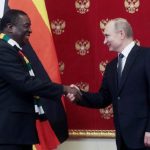We are also concerned about the language used by senior political figures, language which appears to be designed to incite violence. The noble Lord mentioned Vice-President Chiwenga’s call on 26 February for the CCC to be “crushed like lice”, which was perhaps the most alarming language that was used. While we acknowledge President Mnangagwa’s subsequent call for peace, the lack of accountability for the vice-president’s language is clearly a problem. Let me be crystal clear on behalf of the UK Government: language like that has no place in any country or any elections ever. Given the potential for tensions to increase ahead of nationwide elections in 2023, we call on all parties to keep their language measured and conducive to an atmosphere of peaceful and fair campaigning.
We are also concerned by the increase in political violence in the build-up to 26 March. The death of Mboneni Ncube at a CCC rally on 27 February, allegedly at the hands of ZANU-PF supporters, is of particular concern. We welcome the police investigation into the incident and await the outcome of forthcoming legal proceedings. The alleged beating of CCC campaigner Godfrey Karembera while in police custody on 17 March is also of huge concern. Zimbabwe’s constitution is crystal clear: all security forces should remain neutral in all political activity and any incidences of violence must be fully investigated. These efforts to frustrate the opposition’s right to free assembly and to incite violence are not in keeping with President Mnangagwa’s commitments or Zimbabwe’s constitution. It is in that spirit that we call them out, seek accountability and ask that lessons be learned.
On the voters’ roll, we welcome the Zimbabwe Electoral Commission’s efforts to ensure that each polling station had a full voters’ roll published outside for public viewing. However, we are concerned at the confusion regarding the publication of the final voters’ roll in the build-up to the 26 March by-elections. Combined with insufficient voter education, this resulted in some voters being turned away from polling stations after having registered after the official cut-off date. We are also aware of the accusations of voters being moved into new constituencies without their knowledge and of abnormally large numbers of voters being registered in individual homes. A transparent and accessible voters’ roll is clearly essential to build trust in the electoral system.
Following the by-elections of 26 March, and reflecting on the international observer missions after the 2018 elections, we are joining others in pressing the Government of Zimbabwe to make far greater efforts on reforms and to ensure free, fair and credible presidential and parliamentary elections in 2023. The 2018 observer missions called for a number of measures, few of which have yet been seen through to completion. Clear voter registration and publication of an accurate voters’ roll, transparent use of state-owned resources and more effort to demonstrate the independence of the Zimbabwe Electoral Commission are essential to the elections’ credibility. The Government must also fulfil their commitment to allow equal access to state-owned media. The noble Baroness, Lady Hoey, raised a point about election monitoring. We are pleased that election monitoring has been offered. The initial indications are that the Government of Zimbabwe are open to that and we will keep pressing very hard to ensure that that follows through. The UK, with our international partners, stands ready to support Zimbabwe to make progress on these important issues.
In relation to the question on sanctions raised by the noble Lord, Lord Alderdice, and, coming from a different angle, by the noble Lord, Lord Collins, who I thank for his support of the Government’s position, our designations seek to hold to account individuals responsible for egregious human rights violations and corruption. The sanctions do not target and seek to avoid impact on the wider economy and the people of Zimbabwe. They will be retained as long as accountability is lacking and the human rights situation in Zimbabwe justifies them. The noble Lord, Lord Alderdice, raised the spectre of China and Russia. Although we do not have time in this debate to go into the details, he makes an important point and one that is very much on the radar of the Foreign, Commonwealth and Development Office in relation to Zimbabwe and numerous other countries in the region.
Continued next page
(590 VIEWS)



Pingback: Zimbabwe tells Britain to mind its own business | The Insider